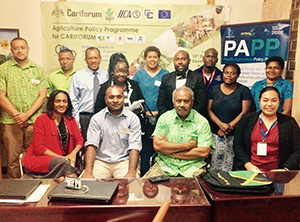Pacific-Caribbean learning exchange to strengthen capacity for researchers and extension officers
 Kingston, Jamaica, 10 October 2016/ IntraACP APP Press Release: Nine Pacific Island researchers and extension officers commenced a two week learning exchange in the Caribbean islands of Jamaica and Trinidad. Over the next 2 weeks extension officers from Vanuatu, Samoa, PNG, Fiji and the Pacific Community will learn and exchange practices covering staple crops such as yams, dasheen (taro), cocoyam (xanthosoma) and sweet potatoes with their Caribbean counterparts.
Kingston, Jamaica, 10 October 2016/ IntraACP APP Press Release: Nine Pacific Island researchers and extension officers commenced a two week learning exchange in the Caribbean islands of Jamaica and Trinidad. Over the next 2 weeks extension officers from Vanuatu, Samoa, PNG, Fiji and the Pacific Community will learn and exchange practices covering staple crops such as yams, dasheen (taro), cocoyam (xanthosoma) and sweet potatoes with their Caribbean counterparts.
This exchange, is hosted by the Caribbean Agriculture Research and Development Institute (CARDI) and supported by the Technical Centre for Agricultural and Rural Co-operation ACP-EU (CTA), and the Pacific Community (SPC) through the European Union supported Agriculture Policy Project (PAPP). The exchange will take place at two centres – The Biotechnology Centre at the University of the West Indies (UWI), and the Scientific Research Council. In addition, the exchange will involve interaction with Caribbean farmers and exposure to root crops value chains such as the UWI-Columbia cassava flour project, Red Stripe cassava beer initiatives and bammy production.
Vili Caniogo an APP Adviser stated that these south-south exchanges were extremely valuable given the similarity in climatic conditions, the much needed focus on food staples and the common goals for the agriculture sector in both regions.
“This exchange focussing on food staples is extremely topical and is selected for strategic reasons. There is evidence that Pacific crop staples such as taro, sweet potatoes and breadfruit and related cropping practices are relatively resilient to projected climate change – hence the need to increase their role in meeting food demand. We hope that these south-south learnings will help officers from both regions exchange, adopt and disseminate new, proven methods”
Mr Caniogo went on to state that a recent review by SPC of National Agriculture Sector Policies covering 15 Pacific countries showed that food security and climate smart agriculture was a key goal for many countries and as such “Exchanges like these will help implement these strategic goals.”

The exchange which starts on the 9th October and ends on the 27th October is the third of a series of ‘south-south’ initiatives for knowledge sharing and learning across the two regions. It follows two previous attachments by Caribbean researchers and extension officers with the Pacific Community (SPC)’s Centre for Pacific Crops and Trees (CePaCT) in Suva, Fiji in 2015 and 2016 respectively.
Sustainable development across both the Pacific and Caribbean regions is increasingly focused on food and livelihood security. A recent spate of highly damaging natural disasters including Tropical Cyclones Pam and Winston (which severely impacted several Pacific countries), highlighted the extreme vulnerability of small island states to these now frequent occurrences. The extent of devastation from these natural disasters have been widespread, adversely affecting thousands of households, infrastructure and farming systems.
According to SPC Deputy Director General, Dr Audrey Aumua, “as part of SPC’s programmatic efforts to improve resilience to climate change and disaster in our region, climate smart agriculture is at the forefront of our contribution to the global agenda on sustainable development. We are grateful to our valued donors such as the European Union and our partners, CARDI and CTA through the Intra-ACP PAPP for the significant collaboration on this technical exchange”.
Participants during the two week exchange were selected following a detailed process managed by SPC and CTA through its existing networks which include the Pacific Islands Rural Advisory Services (PIRAS), and the Pacific Islands Farmers Organisation Network (PIFON). Participants are all currently involved in existing work with roots and tubers in the Pacific, to ensure post-impact implementation following the Caribbean exchange.
Background:
The Intra-ACP Agriculture Policy Programme (APP) supported by the European Union. The Pacific component is implemented across the 15 Pacific Island ACP countries by the Pacific Community (SPC).
More information on the project can be found at the following link www.spc.int/pafpnet
(Photo above: Some of the participants at the Pacific – Caribbean exchange programme/ Photo provided)
Media contacts:
Salome Tukuafu – Information and Communications Management Officer, SPC salomet@spc.int
Vili Caniogo – Team Leader, Pacific Agriculture Policy Project (PAPP), SPC vilic@spc.int +679 992 4318
